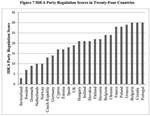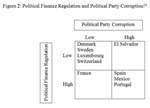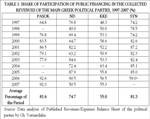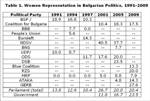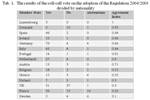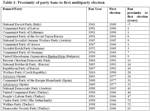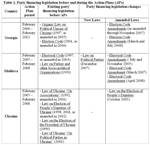Publications
Working paper series
Vernardakis, Christoforos, 2014, The financing of parties and its impact on their transformation from institutions of social representation to institutions of state legitimization. The case of Greece, working paper series on the legal regulation of political parties, no. 42, February.
The regulations governing public financing belong to the broader field of regulations that concern the function of political parties and, especially, their incorporation into the normative legal-constitutional realm. In particular, party funding constitutes one of the most significant issues involved in the function of political systems. In Greece, [...]
Gen?kaya, ?mer Faruk , 2014, Impact of Party Regulation on Small Parties and Independent Candidates in Turkey, working paper series on the legal regulation of political parties, no. 41, February.
Turkey, as being both a "second-" and "third-wave democracy" (Huntington, 1991), considered political parties as "indispensable elements of democratic political life" starting with the 1961 Constitutional period. However, the party regulations have followed a path from a more liberal to a more restricted regime since the 1960s [...]
Gherghina, Sergiu , 2014, The Impact of Party Regulation on Membership Rates in Post?Communist Europe, working paper series on the legal regulation of political parties, no. 40, February.
For more than two decades the post-communist political parties have sought to increase their popular legitimacy. The membership organisation is one way to achieve this goal but its size considerably varies across parties. This article contributes to research on the causes of membership variation by analysing the effects of party statute regulations. In doing so, it controls for previous explanations such as age, ideology, incumbency, and electoral support. [...]
Taleski, Dane and Casal B?rtoa, Fernando, 2014, Party Regulation and Party System Development in Macedonia (1990-2012), working paper series on the legal regulation of political parties, no. 39, February.
Party regulation in general has not been a matter of concern until very recently. Un fortunately, in the most recent publications in the field scholars have tended to focus on the most consolidated South and East Central European democracies, leaving aside regions like the Balkans where party regulation has played an important role in terms not only of party system formation but also on democratic transitions. In order to fill this gap, this paper explores how political parties have been regulated in Macedonia. Empirically, the paper analyses how the different types of regulation have affected the Macedonian party system in terms of formation and development. The main conclusion is that such laws have had a mixed impact on the country?s political life. [...]
Evangelos Kyzirakos, 2013, Law as Politics? An examination of the interdependence between law and politics in the German Federal Republic, working paper series on the legal regulation of political parties, no. 38, September.
The legal regulation by constitutional and public law has trends to become the norm in European representative democracies. What are the implications in normative and "praxis" terms of this development? How does legal regulation influence politics and especially the instruments of politics such as political parties? The Federal Republic of Germany constitutes the first state to have embarked upon an extensive regulation by law of political parties, thus constituting itself as an example that was later to be followed by other states in Europe. In my paper I will explore, using the Federal Republic of Germany as an example, the influence that the legal regulation of political parties by law has had upon the nature of political parties, as instruments of politics, as well as over the very content of political parties as such. [...]
J?nis Ikstens, 2013, Party Regulation in Latvia: A Relative Success, working paper series on the legal regulation of political parties, no. 37, July.
This paper sets to explore party law in Latvia in its broader sense ? a body of legislation that directly affects political parties (M?ller and Sieberer 2006) including laws that regulate establishing and maintaining a party, political funding, and campaigning for office. Of particular interest are factors affecting the adoption of particular regulatory regime as well the impact of regulation on parties and party system in Latvia. Given a protracted period of transition from a non-democratic regime in Latvia [...]
Danica Fink-Hafner and Alenka Kra?ovec , 2013, Party Regulation as an Instrument of Party System Consolidation and of Mending Party Legitimacy in Slovenia, working paper series on the legal regulation of political parties, no. 36, July.
The process of democratisation in Slovenia has been gradual and included a liberalisation stage within the former socialist system when, although not legally allowed, political pluralism and oppositional activity were tolerated by the elite in the Socialist Republic of Slovenia. The regulation of modern political parties only became possible when the Slovenian party elite decided to allow political pluralism as part of a legally determined democratisation process. On one hand, the political elite did control the democratisation processes. On the other hand, the regulation of political parties was quite generous in terms of the relatively easy preconditions for establishing a political party. [...]
Daniela R. Piccio, 2013, Party Regulation in Italy, working paper series on the legal regulation of political parties, no. 35, July.
This article looks at party regulation as a dependent variable: what factors drive the evolution of party regulation? This question is addressed within the theoretical debate on the role of party regulation in modern democracies and on the alleged self-serve mechanisms that rules on political parties - and party finance rules in particular - have brought about. Italy makes a particularly good case to observe since the discussion on party regulation in this country has a long history, which started in the Constitutional Assembly of 1946 and has remained high on the political and public agenda ever since. [...]
Paul Whiteley, 2013, Does Regulation Make Political Parties More Popular? A Multi-level Analysis of Party Support in Europe, working paper series on the legal regulation of political parties, no. 34, July.
This paper examines the relationship between party regulation, trust in political parties and partisanship in twenty-four European democracies in 2010. It tests two rival hypotheses, one suggesting that the regulation of political parties improves support for them among electorates, and the other arguing the opposite case that regulation inhibits support for parties. These hypotheses are tested using a multi-level modelling strategy which controls for a number of variables which might account for trust in parties and partisanship at the individual level. The evidence suggests that heavy regulation of political parties is associated with low levels of trust in parties and fewer partisans in these countries. [...]
Lars Sv?sand, 2013, Regulations of political parties and party functions in Malawi: incentive structures and the selective application of the rules , working paper series on the legal regulation of political parties, no. 33, July.
The party system in Malawi has been characterized by instability and fragmentation since the re-introduction of multiparty democracy in 1993. In part this instability is rooted in the legal framework regulating political parties as organizations and the functions that parties perform in a democracy. The paper outlines the constitutional and legal framework of political parties, But more importantly for party system developments are how regulations of the functions which parties perform in a democracy, such as candidate nomination, campaigning and representation in parliament, interact with the structure of the political system, leading to party system instability. [...]
Fransje Molenaar, 2013, Legitimizing political party representation? Party law development in Latin America , working paper series on the legal regulation of political parties, no. 32, July.
Over the last decades Latin American countries have increasingly limited access to the representative process to ideal-typical political parties. This raises the question to what extent parties' exclusive claims over the representative process can be legitimized through legal validation. A discussion of instances of cartelizing party laws shows the limits of this strategy, as these attempts all collapsed under demands for political change. A similar backlash is visible in cases where the rejection of parties' representative claims led to their deregulation. [...]
Gherardo Scherlis, 2013, Parties and Ballot Access in Latin America: A New Trend in a New Political Context, working paper series on the legal regulation of political parties, no. 31, July.
For the last ten years a group of Latin American countries have passed legal reforms raising ballot access requirements. Although each of these reforms have been profusely discussed in every one of the countries involved, so far, they have not been linked as constituting a regional trend. Firstly this paper shows that this trend actually exists, so reversing the dominant leaning on reforms in this field during the 1980s and 1990s. Secondly, the paper shows that the ongoing regional trend emerges in the aftermath of a legitimacy crisis which has been surmounted in every one of the cases. More specifically, the paper identifies a common sequence followed by four countries (Argentina, Colombia, Mexico and Peru) [...]
Fernando Casal B?rtoa, Fransje Molenaar, Daniela R. Piccio and Ekaterina R. Rashkova, 2013, The World Upside Down: De-Legitimizing Political Finance Regulation, working paper series on the legal regulation of political parties, no. 30, July.
Political finance regulation is often praised in terms of its ability to introduce equality among political parties, to create more transparent political parties and to lower the influence of affluent donors on the political decision-making process. Little examination exists, however, of the effectiveness of this type of regulation. This article aims to fill this gap by addressing whether and to what extent different types of public funding regulations have improved the legitimacy of political parties [...]
Fernando Casal B?rtoa and Maria Spirova, 2013, Get a Subsidy or Perish! Public Funding and Party Survival in Eastern Europe, working paper series on the legal regulation of political parties, no. 29, February.
Much has been written about the state financing of political parties, its characteristics and its consequences for party behavior. In these works, party financing by the state is seen as both a bane and a blessing for the encouragement of strong party competition. Without any state funding, small and private-resource poor parties have little chance of making it in the electoral competition. At the same time, [...]
Ekaterina R. Rashkova, 2013, Women in High-Level Politics: The Role of Path Dependence, working paper series on the legal regulation of political parties, no. 28, January.
Gender inequality is a known phenomenon in many spheres in life; yet, it is especially conspicuous in high-level governmental positions. Men tend to get elected more and more often to posts of vast political importance. In comparison to established democratic countries, the gender gap in high-level political positions is larger in developing democracies. Extant scholarship suggests however, that the gender gap is reduced by democracy and democratic practices of inclusion and equality. [...]
Christoforos Vernardakis, 2012, From Mass Parties to Cartel Parties: The Evolution of the Structure of Political Parties in Greece through Changes in their Statutes and Systems of Financing , working paper series on the legal regulation of political parties, no. 27, June.
There is a phrase in the history of party sociology that was put forward about sixty years ago and is still valid today: ?Modern parties are much less determined by their program or by the class origin of their supporters, as compared to the nature of their organization? (Duverger, 1976: 20). This sophisticated and pioneering observation by Maurice Duverger was made at a time when the prevailing view stated that political parties are primarily determined by their electoral base and their political program, rather than by their organization. [...]
Daniela R. Piccio, 2012, Party Regulation in Italy and its Effects, working paper series on the legal regulation of political parties, no. 26, June.
Political pluralism is the fundamental principle around which the newly established Italian democracy formed after the II World War. The Italian Constitution introduced universal suffrage, established proportional representation as the electoral system, gave central power to the Parliament and established the freedom of association in political parties. The dividing line with the fascist period, which had eliminated free elections, marginalized the Parliament, outlawed all opposition parties, and introduced a majoritarian system, could not be clearer. However, the recognition of political parties in the Constitution had little implications for their regulatory framework. [...]
Fernando Casal B?rtoa, Juan Rodr?guez Teruel, Oscar Barber? & Astrid Barrio, 2012, Uneasiness with the Status Quo: Party Regulation and Party Finance in post-Francoist Spain (1976-2012), working paper series on the legal regulation of political parties, no. 25, June.
Party regulation in new democracies in general, and in the Spanish political system in particular, has not been a matter of concern until very recently. So far this topic has been persistently neglected by political studies, which considered it an issue for academic lawyers. However, this attitude has recently started to change, since party law has become an institutional factor that might affect strongly the dynamics of party systems, as well as foster intra-party democracy. [...]
Gabriella Ilonszki & R?ka V?rnagy , 2012, The Diminishing Importance of Party Regulation in Hungary? When and How Do Institutions Matter?, working paper series on the legal regulation of political parties, no. 24, May.
Party regulation is a debated phenomenon: there is a growing demand for party regulation to ensure transparency and to fight corrupt processes while regulation in itself can serve as a tool for cartelization. The situation is even more blurred in EastCentral European countries where regulation does not reflect the public demand but rather the elite-consensus born at the time of regime-change and thus the roles of regulators and regulated actors are often blurred. [...]
Fernando Casal B?rtoa, Kevin Deegan-Krause, Peter U?en , 2012, The Limits of Regulation: Party Law and Finance in Slovakia (1990-2012), working paper series on the legal regulation of political parties, no. 23, May.
It is one of the paradoxes of democracy that we together create rules to bind our own hands. Moves by parties to restrict party behaviors are thus crucial both for understanding what is possible in a given democracy and for shedding light on democracy itself functions. The detailed regulation of political parties must find the delicate balance between a too-narrow restriction of party activity, and a too generous permission that may lend itself to overextension. [...]
Fernando Casal B?rtoa & Marcin Walecki, 2012, Party Regulation and its Effects on the Polish Party System (1991-2011), working paper series on the legal regulation of political parties, no. 22, May.
The development of a democratic political society - political parties, electoral rules, interparty alliances, and the legislature - is one of the major challenges for any transition regime. Political parties are the best institutions to effectively select and monitor democratically elected governments. In general, in the first stage of democratic transition, most post-Communist countries, including Poland, adopted a more laissez-faire stance towards the regulation of political parties. [...]
Ekaterina R. Rashkova & Maria Spirova, 2012, Party Regulation in Post-communist Bulgaria, working paper series on the legal regulation of political parties, no. 21, May.
Since the fall of communism and the transition to democracy all East European states have transitioned to multiparty democracies. However, the legal frameworks within which parties function differ substantially among countries. Some countries, embrace diversity without posing obstacles to mobilization on ethnic grounds, for example, while others prohibit the establishment and existence of parties of ethnic ideology. Here, we study how Bulgarian parties are regulated through the Party Law, the Electoral Law and the Constitution. [...]
Tim Haughton , 2012, A Law Unto Themselves: Money, Regulation and the Development of Party Politics in the Czech Republic, working paper series on the legal regulation of political parties, no. 20, May.
If there is one thing all pundits seem to agree on it is that money matters in politics. Without money it is difficult to do much politically. Both running an organization and campaigning require resources. Moreover, political parties in democracies function in systems with frameworks of laws and regulations. Even those who like to downplay the importance of institutional frameworks recognize that at the very least such laws and regulations provide guiding lights and reference points for parties. [...]
Ekaterina R. Rashkova & Emilia Zankina , 2012, When Less Means More: Influential Women of the Right ? the Case of Bulgaria, working paper series on the legal regulation of political parties, no. 19, April.
This paper investigates the commonly accepted belief that women's presence in political life and more specifically in parliament furthers the substantive representation of women. The hypothesis is examined within the context of Bulgaria. The conventional wisdom is challenged by the historical legacy of the Communist Party which included a sizeable number of women among its ranks, yet women with no particular voice. [...]
Daniela R. Piccio, 2012, Party Regulation in Europe: A Comparative Overview, working paper series on the legal regulation of political parties, no. 18, March.
Party regulation has received growing consideration from the scholarly literature in recent years. The increasing attention towards this phenomenon reflects a trend of proliferation in European countries adopting rules which affect political parties in their internal organization, their external activities, or their financial management. Yet, with the possible exception of party finance, comparative research about the different aspects of party regulation is still scarce. This paper collects information on the regulation of political parties in thirty-three European democracies. [...]
Fransje Molenaar, 2012, Latin American Regulation of Political Parties: Continuing Trends and Breaks with the Past, working paper series on the legal regulation of political parties, no. 17, March.
This paper looks at the development of the legal regulation of political parties in Latin America, with a focus on the content of the legal changes that have occurred over the last decade. Attention is paid in particular to the development of legal norms related to the registration and dissolution of parties, provisions for internal democracy and candidate selection, and the regulation of private funding, public funding, and access to the media. [...]
Fernando Casal B?rtoa, Daniela R. Piccio, Ekaterina R. Rashkova , 2012, Party Law in Comparative Perspective, working paper series on the legal regulation of political parties, no. 16, March.
Political parties have become increasingly subject to laws in the recent years. The liberal principle of non intervention in political parties? internal matters that prevailed across the European continent since the very emergence of political parties as organizations seems no longer to be the dominant paradigm. [...]
Fernando Casal B?rtoa , 2011, It?s Mostly About Money! Party System Institutionalization and its Sources: Reducing Causal Complexity in Post-communist Europe, working paper series on the legal regulation of political parties, no. 15, November.
Although much has been written about the process of party system institutionalization, the reasons why some party systems institutionalize remains a mystery. Seeking to solve such puzzle, and making use of three different methodological techniques (MDSO/MSDO, csQCA and process-tracing), this paper constitutes an attempt to explain what, how, and why some post-communist party systems institutionalized (while others have not). [...]
Wojciech Gagatek, 2011, Political Financing Regulation at the EU Level: The Conflict of National Traditions and Interests, working paper series on the legal regulation of political parties, no. 14, November.
In 2003 the European Union passed its first-ever regulation on the recognition and financing of extra-parliamentary political parties at European level (the so called Europarties). By enacting such a law, the (non-state) EU joined the majority of democratic states which provide political parties with public subsidies. [...]
Gemma Loomes, 2011, The Impact of Cartel Strategies in France, Greece, Denmark and Ireland, working paper series on the legal regulation of political parties, no. 13, November.
This paper aims to explore the relationship between engagement in cartel strategies and the fate of established parties in Europe. The paper explores four dimensions of ?institutional? or cartel strategies: electoral laws; the electoral system; televisions advertising and state subsidies, and analyses the extent to which high or low levels of engagement in these strategies impacts upon the electoral and governmental success of ?established? political parties across Europe during the post-war period. [...]
Ingrid van Biezen and Ekaterina Rashkova, 2011, Breaking the Cartel: The Effect of State Regulation on New Party Entry, working paper series on the legal regulation of political parties, no. 12, October.
Despite the growing amount of party regulation, we still have a limited understanding of the effect that party laws have on political competition. Notwithstanding the predictions that incumbent parties adopt rules favouring their own position, found both in the cartel party thesis and the rational actor view of politics, we continue to witness the appearance of new political parties, some of which successfully enter parliament. [...]
Carina S. Bischoff, 2011, New Parties in Advanced Democracies: Causes and Barriers to Participation, working paper series on the legal regulation of political parties, no. 11, October.
This paper analyses the determinants of new party entry in advanced industrial democracies. Over the past decades established party systems have increasingly been challenged by new parties, but the frequency of new competitors arising varies greatly across elections. Previous studies have, however, provided contradictory answers to the question of what facilitates or bars new party participation. This study suggests that methodological problems lie at the root of the discrepancies and suggests ways to deal with these. [...]
Gauja, Anika , 2011, Comparative Gatekeeper Provisions in Party and Electoral Law: Sustaining the Cartel?, working paper series on the legal regulation of political parties, no. 10, October.
This paper presents a comparative analysis of the legal regulation of political parties as competitors in, and as new entrants to, the electoral contest. The paper focuses on laws that regulate both ballot access and the registration of political parties as ?official' electoral actors. It explores the ways in which these laws are used as ?gatekeeper' provisions to control the degree of party competition in any given electoral system, and how specific laws (although applying equally to all parties) might privilege some parties (for example, incumbents) over others. [...]
Borz, Gabriela, 2011, Contemporary Constitutionalism and the Regulation of Political Parties: A Case Study of Luxembourg, working paper series on the legal regulation of political parties, no. 09, September.
This article discusses the regulation of political parties by contemporary constitutional practices. It presents a framework for analysis that identifies the types of justifications and actors involved in the process of constitutional regulation of political parties. Empirically it focuses on the special case of Luxembourg, which provides a recent and rare case of [...]
Sergiu Gherghina, Mihail Chiru and Fernando Casal B?rtoa, 2011, State Resources and Pocket Money: Shortcuts for Party Funding in Romania, working paper series on the legal regulation of political parties, no. 08, July.
This paper is the first systematic attempt to map the evolution of legal regulations concerning campaign finance in post-communist Romania and to link them with corruption practices parties have been engaged in, over the last decade. Our document analysis reveals a general increase in the complexity of the legal framework regulating campaign spending with a positive impact on reducing corruption. [...]
Angela K. Bourne , 2011, Democratisation and the Illegalisation of Political Parties in Europe, working paper series on the legal regulation of political parties, no. 07, February.
This article explores theoretical explanations for the proscription of political parties in democratisating states. A survey of twenty-two party bans in twelve European states identifies two distinct classes of proscription derived from the ?degree of democratisation? present in a banning state. Drawing on the democratisation literature, I identify features of ?new? and ?incomplete? democracies that help explain proscription. Case studies on Germany, Austria, Russia, Latvia and Greece [...]
Natalia Timus, 2010, The Impact of European Democracy Promotion on Party Financing in the East European Neighborhood, working paper series on the legal regulation of political parties, no. 06, August.
The paper investigates how the cooperation of European institutions (EU, CoE, and OSCE) in democracy promotion affects the success of European conditionality on party financing in East European neighboring countries. It examines the two major European level factors, the determinacy of requirements and the rewards, based on the case study of Ukraine, Moldova, and Georgia and a cross-case comparative analysis before and during Action Plans? period. [...]
Ekaterina R. Rashkova, 2010, Political Learning, Legal Constraints and Party System Development: How Do Party Law and Democratic Maturity Affect the Number of Parties?, working paper series on the legal regulation of political parties, no. 05, July.
While scholars agree that the stability of the party system is imperative for the proper functioning of democracy many note the high number of political parties in new democracies, yet we still lack a systematic comparative analysis of party system development in such states. A possible reason for this is that extant theories on the number of parties were written with established democracies in mind and are thus unequipped to explain the dynamics taking place in young democracies. [...]
Fransje Molenaar, 2010, The Development of European Standards on Political Parties and their Regulation, working paper series on the legal regulation of political parties, no. 04, March.
Over the last decade many European countries have increased both the scope and content of national party regulation. This trend is mirrored by an ever-increasing interest within European governmental and non-governmental organizations to guide this process and to determine the direction as regards its content. [...]
Ingrid van Biezen, 2009, Constitutionalizing Party Democracy: The Constitutive Codification of Political Parties in Post-war Europe, working paper series on the legal regulation of political parties, no. 03, November.
This paper analyzes the process of party constitutionalization in post-war Europe, arguing that the constitution has become an important source of party law. It explores the temporal patterns of party constitutionalization and reveals their connection with incidents of fundamental institutional restructuring. It furthermore advances different models of party constitutionalization, and addresses the question what these convey about the underlying conceptions of party democracy. [...]
Kenneth Janda, 2009, Laws Against Party Switching, Defecting, or Floor Crossing in National Parliaments, working paper series on the legal regulation of political parties, no. 02, August.
Many western scholars may be surprised to learn that parliamentary members who switch parties during the session may be expelled from parliament because they violate the law in their country. This paper studies such "anti-defection" laws. It investigates the extent of such legislation; why and how often legislators switch parties; how this phenomenon has been studied; why some scholars favor banning party switching; why politicians have legislated against party defections; and the consequences of such bans for political parties and party systems. [...]
Ingrid van Biezen & Gabriela Borz, 2009, The Place of Political Parties in National Constitutions: A European Overview, working paper series on the legal regulation of political parties, no. 01, July.
This is the first working paper in the series on The Legal Regulation of Political Parties in Post-War Europe. The series hosts working papers associated with the research projects on The Constitutional Regulation of Political Parties in Post-War Europe (funded by the UK Economic and Social Research Council - ESRC) and Re-conceptualizing Party Democracy (funded by the European Research Council - ERC). In this first working paper, we concentrate on the empirical dimensions of the constitutional codification of political parties in post-war European democracies. [...]
Other publications
Ingrid van Biezen and Hans-Martien ten Napel, 2014, forthcoming, Regulating Political Parties: The Netherlands in Comparative Perspective, Leiden: Leiden University Press
Ekaterina Rashkova & Emilia Zankina, 2014, forthcoming, When Less Means More: Influential Women of the Right - the Case of Bulgaria, In Karen Celis and Sarah Childs (eds.), Gender, Conservatism and Political Representation. Colchester: ECPR Press
Daniela R. Piccio , 2014, Political finance in Western Europe, In Funding of Political Parties and Election Campaigns. Stockholm: International IDEA, pp. 206-252.
Financial resources play a crucial role in determining which actors participate in the political process in modern democracies. The importance of the ways in which political parties access and use financial resources has stimulated the regulation of political finance around the world, including in Northern, Western and Southern Europe. This chapter identifes the most important challenges of political finance legislation in these countries and compares European regulatory patterns (implementation and eff ectiveness in particular) to those in other regions. [...]
Ingrid van Biezen and Ekaterina R. Rashkova (eds.), 2014, Contested Legitimacy. Paradoxes in the Legal Regulation of Political Parties, Special issue of the International Political Science Review, vol. 35, no. 3, pp. 265-274
Recent waves of social protests have brought a renewed interest in the notion of political legitimacy. The increasing adoption of party regulation as a means to secure legitimacy, however, leads to several paradoxes. One such paradox is the fact that those who establish the rules about political parties are representatives of the political parties themselves. Despite this existing contention, the relationship between political legitimacy and party regulation has received little scholarly attention. Addressing this relationship, our special issue brings together articles [...]
Fernando Casal B?rtoa, Fransje Molenaar, Daniela R Piccio, and Ekaterina R Rashkova , 2014, The world upside down: Delegitimising political finance regulation, International Political Science Review, Vol. 35, No. 3, pp. 355-375
Political finance regulation is often praised in terms of its ability to introduce equality among political parties, to create more transparent political parties and to lower the influence of affluent donors on the political decision-making process. Little examination exists, however, of the effectiveness of this type of regulation. This article aims to fill this gap by addressing whether and to what extent different types of public funding regulation have improved the legitimacy of political parties [...]
Fransje Molenaar, 2014, Legitimising political party representation: Party law development in Latin America , International Political Science Review, Vol. 35, No. 3, pp. 324-338
This study traces the development of party law from its first appearance in the early 20th century to its re-appearance in post-transitional Latin America and demonstrates how legislators frequently use party law to legally validate the participation of political parties in the electoral process. Through an analysis of instances of cartelising party laws and party deregulation, this article shows [...]
Ingrid van Biezen and Fernando Casal-B?rtoa (eds.), 2014, The Regulation of Party Politics: Southern Europe in Comparative Perspective, Special issue of South European Society and Politics, vol. 19, no. 1
Despite its increasing importance, the phenomenon of party regulation has hitherto received relatively little systematic and comparative scholarly attention. The contributions to this special issue fill part of this lacuna by evaluating the various dimensions of party regulation and their impact on the parties and the party systems in post-authoritarian Southern Europe. [...]
Daniela R. Piccio, 2014, A Self-interested Legislator? Party Regulation in Italy, South European Society and Politics, Vol. 19, No. 1, pp. 135-152
What factors drive the evolution of party regulation? And do political and societal changes have an impact on how legislators shape policy reforms? This article answers these questions by observing the evolution of the regulation of political parties in Italy from 1948 to 2012. Through an in-depth analysis of the major sources of party law of the country, the author [...]
Fernando Casal B?rtoa, Juan Rodr?guez-Teruel, Oscar, 2014, The Carrot and the Stick: Party Regulation and Politics in Democratic Spain, South European Society and Politics Volume 19, No. 1, pp. 89-112
Party regulation in new democracies in general, and in the Spanish political system in particular, has not been a matter of concern until very recently. In order to fill this gap, this article explores the way political parties have been regulated not only in the Constitution, but also in the main laws regulating party foundation, [...]
Fransje Molenaar, 2012, Mexico Elections 2012: A Study of the Regulation and Oversight of Political Parties? Financial Resource, Washington D.C.: IFES
Fernando Casal-B?rtoa, Fransje Molenaar, and Daniela R. Piccio (Contributors) , 2012, Political Finance Regulations Around the World: An Overview of the International IDEA Database, Stockholm: International IDEA
Ingrid van Biezen, 2012, Criteria, conditions, and procedures for establishing a political party in the Member States of the European Union, European Parliament, Directorate General for Internal Policies, Policy Department C - Citizens? Rights and Constitutional Affairs.
Ingrid van Biezen and Ekaterina R. Rashkova , 2013, The Politics of Gender and Party Regulation: Official Quota and Beyond, Special issue of Representation, vol. 49, no.4
The subject of party regulation has begun to occupy important place within the field of party politics. To date, however, few studies have analysed the legal regulation of party activity and behaviour from a gender perspective. At the same time, in the gender literature quotas remain the institutional instrument that have drawn the largest amount of scholarly attention, but the impact of the broader regulatory framework for parties on gender representation have remained largely outside the scope of extant studies. With this special section Symposium on Gender Politics and Party Regulation, our aim is to bridge the literatures on party politics and gender through the lens of party regulation, [...]
Fernando Casal B?rtoa, 2013, "The Politics of Party Funding", by Michael KoB (book review), Acta Politica, v. 47, n. 4, pp. 478-480.
During the last decade and a half, and especially after the publication of Katz and Mair's (1995) seminal article on the ?cartel party?, literature on the consequences of public funding for party competition has experienced an important increase. However, and despite such profusion of works ? both quantitative and qualitative ? their findings have been anything but conclusive. [...]
Ingrid van Biezen and Daniela R. Piccio, 2013, Shaping Intra-Party Democracy: On the Legal Regulation of Internal Party Organizations, in William Cross and Richard S. Katz (eds.), The Challenges of Intra-Party Democracy. Oxford: Oxford University Press.
This chapter explores the empirical and normative dimensions of the legal regulation of the internal operation and functioning of political parties which emerge from a comparative content analysis of party laws and national constitutions of all (33) post-war European democracies. It appears that the internal party organization constitutes an increasingly important feature of party regulation in that many countries, often taking their cue from the classic mass party as a prescriptive model of organization, have introduced specific legal or constitutional requirements on intra-party democracy. [...]
Ingrid van Biezen and Gabriela Borz, 2012, Models of Party Democracy: Patterns of Party Regulation in Post-War European Constitutions, European Political Science Review, 4/3: 327-359
This article investigates the ways in which political parties are codified in modern democratic constitutions, providing a unique cross-sectional and longitudinal overview of the patterns of party constitutionalization in post-war Europe. Although the constitutions of western liberal democracies traditionally have paid little attention to the role of parties, evidence suggests that in contemporary democracies, both old and new, they are increasingly accorded a formal constitutional status. [...]
Ingrid van Biezen, 2012, Constitutionalizing Party Democracy: The Constitutive Codification of Political Parties in Post-war Europe, British Journal of Political Science 42(1), pp. 187-212.
This article analyses the process of party constitutionalization in post-war Europe. It explores the temporal patterns of party constitutionalization and reveals their connection with moments of fundamental institutional restructuring. It discusses the different modes of party constitutionalization, and addresses what these convey about the underlying conceptions of party democracy. [...]
Ingrid van Biezen and Fransje Molenaar , 2012, The Europeanization of Party Politics? Competing Regulatory Paradigms at the Supranational Level, West European Politics 35(3), pp. 632-656.
This paper explores the process of Europeanisation of party politics by examining the regulation of political parties by supranational European organisations. Despite the increased relevance of the regulation of the activity, behaviour, organisation and finances of political parties in European democracies, the supranational dimensions of this phenomenon have hitherto received relatively little systematic scholarly attention. This paper adopts an interdisciplinary perspective, combining approaches from the Europeanisation literature with legal theory and party scholarship. [...]
Ingrid van Biezen and Ekaterina R. Rashkova, 2012, Deterring New Party Entry? The Impact of State Regulation on the Permeability of Party Systems, Party Politics. Published online September 2012.
Despite the growing amount of party regulation, we still have a limited understanding of the effect that party laws have on party systems and political competition. Notwithstanding predictions that incumbent parties adopt rules which favour their own position, found in both the cartel party thesis and the rational actor view of politics, we continue to witness the frequent appearance of new political parties, some of which successfully enter parliament. Using comparative electoral data and a newly built dataset on party regulation in post-war Europe, we trace the changes in the rules governing political parties and explore the effect of party regulation on the number of successful new entrants. [...]
Ingrid van Biezen, 2010, Campaign and Party Finance, in Lawrence LeDuc, Richard G. Niemi and Pippa Norris (eds.), Comparing Democracies: Elections and Voting in Global Perspective, 3rd ed. London: Sage, pp. 65-94.
This chapter explores the patterns and traditions of the financing of political parties, candidates and election campaigns in liberal democracies around the globe. It pays attention to the various practices in different countries and regions, addressing the differences between party-based vs. candidate based systems, as well as between party organization vs. campaign-oriented systems. [...]
Ingrid van Biezen, 2010, De maakbare partijendemocratie? Over de (grond)wettelijke regulering van politieke partijen, Res Publica 52(4), pp. 513-530.
The legal basis that underpins the existence of political parties with increased frequency and intensity demonstrates that parties have now come to be seen as necessary and desirable institutions that (ought to) fulfil important functions within the democratic system. On the one hand, the regulation of political parties is aimed at the continued existence of party democracy. It is thus is legally permitted to non-democratic or separatist parties from the system, while existing parties are endowed with important privileges which are not reserved for other forms of social organizations. At the same time, [...]
Ingrid van Biezen, 2008, Party Regulation and Constitutionalization: A Comparative Overview, in Per Nordlund and Ben Reilly (eds.), Political Parties and Democracy in Conflict-Prone Societies: Regulation, Engineering and Democratic Development. Tokyo: UN University Press, pp. 25-47
Political parties have traditionally been understood and analyzed primarily in terms of their linkages with society, and the growing disengagement of citizens from conventional politics in recent years is well-documented and explored theoretically and empirically. However, we know comparatively little about the other side of the process of party organizational transformation, i.e. what Katz and Mair have argued consists of a strengthening of their links with the state. [...]
Ingrid van Biezen, 2008, State Intervention in Party Politics: The Public Funding and Regulation of Political Parties, European Review 16/3 (2008), pp. 337-353 *Reprinted in Keith Ewing, Jacob Rowbottom and Joo-Cheong Tham (eds.), The Funding of Political Parties. London: Routledge (2011), pp. 191-205.
This article is concerned with a closer investigation of the growing tendency for the state to intervene in contemporary party politics. It examines two trends. First of all, it looks more closely at the increased levels of regulation of party activity and behaviour in European democracies, discussing the empirical practice as well as the underlying normative paradigms of party regulation. Secondly, it examines the increased availability of public funding to political parties from a comparative perspective, while also exploring the motivations for its introduction in light of particular understandings of party democracy. [...]






